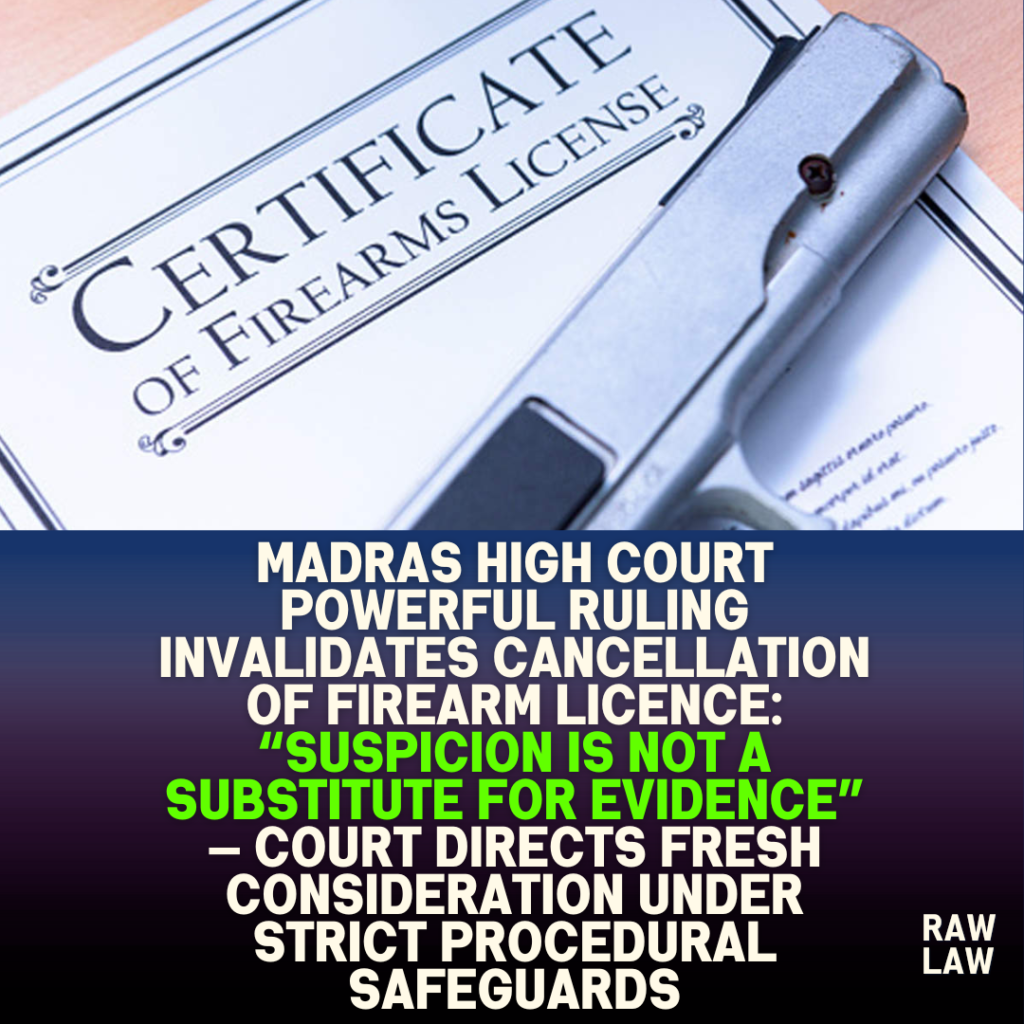Court’s decision
The Madras High Court quashed the administrative order cancelling a firearm licence issued to the petitioner and directed the licensing authority to reconsider the matter strictly in accordance with the provisions of the Arms Act and the principles of natural justice. The Court held that the cancellation was based on vague allegations, absence of supporting material, and an improper understanding of statutory requirements. Observing that “suspicion is not a substitute for evidence,” the Court emphasised that firearms licensing decisions, though involving public safety, cannot be arbitrary or unsupported by factual findings. The matter was remanded for fresh adjudication with a direction to furnish reasons and consider all relevant factors.
Facts
The petitioner was granted a firearm licence several years ago and had been regularly renewing it. A show-cause notice was later issued alleging that he had threatened individuals using the weapon and that the licence posed a risk to public safety. The petitioner denied the allegations and asserted that no criminal case or complaint existed against him. Despite this, the licensing authority cancelled the licence without furnishing evidence, citing general concerns over law and order. The appellate authority affirmed the cancellation. The petitioner approached the Madras High Court seeking judicial review, arguing that the cancellation was arbitrary and unsupported by the statutory grounds required under the Arms Act.
Issues
The High Court identified several issues:
- Whether the cancellation of the firearm licence satisfied the statutory grounds under the Arms Act.
- Whether the petitioner was given a fair opportunity to rebut the allegations.
- Whether unverified allegations, without independent evidence or pending criminal proceedings, can justify licence cancellation.
- Whether the licensing authority discharged its obligation to record objective satisfaction based on material evidence.
- Whether the appellate authority applied the correct legal standards while affirming the cancellation.
Petitioner’s arguments
The petitioner argued that he possessed the weapon merely for self-protection and had never misused it. He emphasised that no FIR, complaint, or enquiry existed against him, and the allegations in the show-cause notice were false, vague, and unsupported. He contended that the authority failed to conduct any investigation to substantiate the claims before revoking the licence. The petitioner asserted that the authority acted mechanically without applying statutory tests and violated the principles of fairness by ignoring his explanations and documentary evidence. He maintained that licence cancellation requires concrete material, not mere assumptions about possible threats.
Respondent’s arguments
The authorities defended their action stating that complaints were orally received regarding the petitioner’s conduct and that the weapon created apprehension among local residents. They argued that the licence was cancelled in the interest of public peace and safety, and the decision need not depend solely on criminal cases. The respondents submitted that wide discretion exists under the Arms Act to revoke a licence whenever public safety demands. The appellate authority similarly claimed that the petitioner’s explanation was not convincing and that maintaining law and order required caution in firearm licensing.
Analysis of the law
The Madras High Court analysed Section 17 of the Arms Act, which permits suspension or revocation of a licence only on specific statutory grounds, such as misuse, danger to public safety, or furnishing of false information. The Court held that discretion under Section 17 must be exercised based on objective evidence, not vague suspicions or unverified statements. The Court emphasised that principles of natural justice require clear notice, disclosure of material relied upon, and meaningful consideration of the licence holder’s explanation. Cancellation of a vested right, the Court noted, cannot occur unless the authority records a reasoned finding demonstrating nexus between the conduct alleged and public safety concerns.
Precedent analysis
The Court relied on earlier judgments holding that firearm licence cancellation cannot be based on mere apprehension or unsupported allegations. Precedents mandate that licensing authorities must show clear reasons indicating misuse or risk. The Court also referred to decisions emphasising that when no criminal case or enquiry exists, authorities must justify cancellation through material evidence and cannot rely on speculative concerns. Past rulings of the Madras High Court and other High Courts guided the Court in holding that arbitrary revocation violates Articles 14 and 21.
Court’s reasoning
The Madras High Court found that the notice and cancellation order did not disclose any material supporting the allegation of threat. The authority relied solely on hearsay without conducting enquiries or verifying the alleged complaints. The Court also observed that the petitioner’s clean record, absence of criminal proceedings, and continuous licence history were ignored. The appellate authority merely repeated the cancellation without fresh examination. The Court reasoned that firearm licensing affects both personal liberty and public safety, and decisions must therefore be well-reasoned, measured, and evidence-based. As these standards were not met, the Court intervened.
Conclusion
The Madras High Court quashed the cancellation order and remitted the matter for reconsideration. It directed the licensing authority to provide the petitioner with all materials relied upon, grant an opportunity to respond, and record a fresh decision within a stipulated time. The Court reaffirmed that firearm licence cancellation requires compliance with statutory requirements and cannot be grounded on conjectures. The petitioner’s writ was allowed, and the administrative authorities were instructed to follow due process without prejudice.
Implications
This ruling strengthens procedural safeguards in firearm licensing matters. It limits arbitrary administrative discretion and ensures that cancellations must be supported by verifiable evidence and detailed reasoning. The judgment serves as guidance for authorities handling weapons licences, reinforcing that public safety cannot be invoked mechanically. For licence holders, the decision provides protection from abrupt deprivation of rights based on mere suspicion. The ruling will influence future litigation involving firearm cancellations across Tamil Nadu and reinforce natural justice principles in arms administration.



